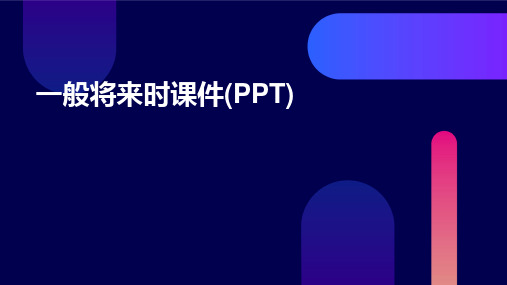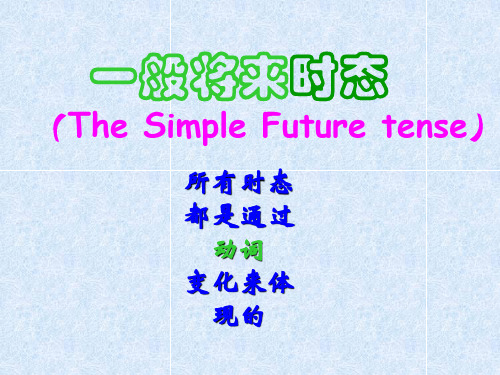新概念英语第一册一般将来时ppt课件
合集下载
英语一般将来时PPT课件

• I shall be free this afternoon.
• 我今将要反复发生的动作
• My uncle will come to see me every Saturday. • 我叔叔每个星期六都会来看我。 • The students will have five English classes per
• 我猜想这是你姐姐。
.
8
• ②用于“祈使句 + and + 陈述句”中 ( 常考结构)
• Work hard and you will succeed.
• 如果你努力,就会成功的。
• Go at once and you will see her.
• 马上去,你就会见到她了。 • (同类)祈使句+or+陈述句 • Work hard or you will fail。 • Go at once or you will not see her。
• 我保证不告诉别人所发生的事。
.
7
• ④ 表示一种倾向或推测
• Flowers will die without water.
• 没有水花会枯死的。
• Water will change into ice at 0℃.
• 水在零摄氏度就会结冰。
• This will be your sister, I guess.
.
10
• I'll let you know as soon as he arrives.
• 他一到我就通知你。
• If you ask him, he will help you.
• 如果你请他,他会帮助你的。
• We shall go unless it rains.
英语语法 一般将来时(共12张PPT)

上一页
第1页,共12页。
时态:一般将来时 The Simple Future Tense
3、 shall与will的区别:
shall常用于第一人称(we/ I ).
shall
否定式:shall not = shan’t
缩略形式 ’ll
will常用于第二、三人称,但在口 will 语中各种人称都可以用will.
is about to leave for Beijing. eg: He Will there be only one country?
注:after+时间段,往往指过去的一段时间。
next Saturday. We will start off in ten minutes.
I was about to start out when it
•
Yes, there will. / No, there won’t.
第9页,共12页。
What can you see in this picture?
There will be…将会有
There will be more people. There will be fewer trees. There will be more pollution. There will be more buildings. There will be more cars.
supper time.
上一页
主菜单 第5页,共12页。
下一页
● 一般将来时 ●
be about to do:表示“即将做某 事”或“将
要做某事” 如come, go, arrive, leave, start, return, meet, get等。
第1页,共12页。
时态:一般将来时 The Simple Future Tense
3、 shall与will的区别:
shall常用于第一人称(we/ I ).
shall
否定式:shall not = shan’t
缩略形式 ’ll
will常用于第二、三人称,但在口 will 语中各种人称都可以用will.
is about to leave for Beijing. eg: He Will there be only one country?
注:after+时间段,往往指过去的一段时间。
next Saturday. We will start off in ten minutes.
I was about to start out when it
•
Yes, there will. / No, there won’t.
第9页,共12页。
What can you see in this picture?
There will be…将会有
There will be more people. There will be fewer trees. There will be more pollution. There will be more buildings. There will be more cars.
supper time.
上一页
主菜单 第5页,共12页。
下一页
● 一般将来时 ●
be about to do:表示“即将做某 事”或“将
要做某事” 如come, go, arrive, leave, start, return, meet, get等。
新概念英语一册语法总复习ppt课件

★肯定回答及否定回答
Yes, I did. No, I didn’t. Yes, he did. No, he didn’t. Yes, they did. No, they did not.
最新版整理ppt
14
4. 现在完成时
构成:主语+助动词have, has+过去分词 用法:
1) 表示过去发生的和现在有某种联系的动作,常和just, usually, already, since等时间副词连用 I have just had lunch. (饱了,不用再吃了) He has had a cup of tea.(不渴了,不用再喝) They have already had their holiday. (不能再度假 了)
We are not having lunch. He is not reading a book. The dog is not running after a cat. The boys are swimming across the river.
最新版整理ppt
9
★特殊疑问句:what, which, how, where, who,
最新版整理ppt
6
2. 现在进行时 表示现在正在进行的动作。 构成: 主语+be动词+动词的现在分词+其它成分
We are having lunch. He is reading a book. The dog is running after a cat. The boys are swimming across the river.
★肯定回答及否定回答:
Yes, he does. No, he doesn’t. Yes, she does. No, she doesn’t Yes, it does. No, it doesn’t.
Yes, I did. No, I didn’t. Yes, he did. No, he didn’t. Yes, they did. No, they did not.
最新版整理ppt
14
4. 现在完成时
构成:主语+助动词have, has+过去分词 用法:
1) 表示过去发生的和现在有某种联系的动作,常和just, usually, already, since等时间副词连用 I have just had lunch. (饱了,不用再吃了) He has had a cup of tea.(不渴了,不用再喝) They have already had their holiday. (不能再度假 了)
We are not having lunch. He is not reading a book. The dog is not running after a cat. The boys are swimming across the river.
最新版整理ppt
9
★特殊疑问句:what, which, how, where, who,
最新版整理ppt
6
2. 现在进行时 表示现在正在进行的动作。 构成: 主语+be动词+动词的现在分词+其它成分
We are having lunch. He is reading a book. The dog is running after a cat. The boys are swimming across the river.
★肯定回答及否定回答:
Yes, he does. No, he doesn’t. Yes, she does. No, she doesn’t Yes, it does. No, it doesn’t.
一般将来时ppt课件

2023/11/29
14
表示邀请或建议
总结词
表示邀请或建议某人做某事,通常用于 口语交流中。
VS
详细描述
在口语交流中,我们经常使用一般将来时 态来表示邀请或建议,例如:“Would you like to come to my house for dinner tomorrow?”(明天你想来我家 吃晚饭吗?)或者“Let's go for a walk after dinner.”(晚饭后我们去散步吧。 )
2023/11/29
23
否定句
结构
主语 + be动词(will not/shall not/can not/may not/must not等) + 动词原形
例句
I will not go to the party.(我不会去参加聚会 。)
2023/11/29
例句
They will not come to our party.(他们不会来参加我们的聚会。)
2023/11/29
16
2023/11/29
04 一般将来时的句型结构
17
主语+助动词will+动词原形
肯定句
I will go to school tomorrow.
否定句
She will not finish her homework.
疑问句
Will they arrive at the airport on time?
“The plane will arrive at 8:00 pm.”(飞机将于晚上8 点到达。)
2023/11/29
11
表示推测或预测
要点一
一般将来时可以用于根据已有的 信息和迹象做出推测或预测,…
一般将来时课件(PPT)

“be able to”表示将来有能力做某 事时,使用一般将来时形式,例如“I will be able to help you”。
情态动词如“can”、“may”、 “must”等,在一般将来时中通常直 接加动词原形,例如“I can swim”。
03
一般将来时在句子中的运用
陈述句中的使用
表示将要发生的动作或存在的状态
纠正方法
应使用正确的将来时形式,如 "He will go to the park tomorrow." 或 "He is going to the park tomorrow."
忽略动词变化规则
错误示例
They will play football in the future.(忽略了动词play在将来时中的变化)
纠正方法
在将来时中,应使用正确的助动词或情态动词形式,如 "I will be able to help you with your homework." 或 "I can help you with your homework."
错误示例
He will must finish his work before leaving.(错误地使 用了情态动词must)
作用
用于表示未来的计划、打算、预测、 假设等。
常见表达形式
will + 动词原形
表示将来的动作或状态,如“I will go to the park tomorrow.”(我明天将去公园。)
be going to + 动词原形
表示计划、打算或即将发生的动作,如“I am going to study hard this semester.”(我这 学期打算努力学习。)
一般将来时态讲解(共25张PPT)

• I wonder what will happen. • 我不知道将会发生什么事。
• I don't think the test will be very difficult. 。
②用于“祈使句 + and + 陈述句” 中
I don’t think it will rain this afternoon.
I am hungry. I think I’ll have something to eat.
表示看法,观点
“There be”句型的一般将来时 肯定句: There will be +名词+其他成份 [注意]:无论后面加单数名词或复数形式,be都必须用原形。
shall适用于第一人称I,We;而will适用于所有人称。 通常可以用will来代替shall。 will,shall均可缩写为:'ll,如:
I will= I'll; she will = she’ll;will not 和shall not分别可以 缩写为 won't 和shan't。
1.一般将来时的用法
4. be about to + 动词原形。 表示 (1)“即将做”或“马上做”
(2)因此,句子不能再用时间状语。
Don’t leave. Li Lei is about to come. 不要走了,李蕾就要来了。 Be quiet. The concert is about to start. 安静下来,音乐演唱会就要开始了。
• My uncle will come to see me every Saturday.
• 我叔叔每个星期六都会来看我。
• The students will have five English classes per week this term.
• I don't think the test will be very difficult. 。
②用于“祈使句 + and + 陈述句” 中
I don’t think it will rain this afternoon.
I am hungry. I think I’ll have something to eat.
表示看法,观点
“There be”句型的一般将来时 肯定句: There will be +名词+其他成份 [注意]:无论后面加单数名词或复数形式,be都必须用原形。
shall适用于第一人称I,We;而will适用于所有人称。 通常可以用will来代替shall。 will,shall均可缩写为:'ll,如:
I will= I'll; she will = she’ll;will not 和shall not分别可以 缩写为 won't 和shan't。
1.一般将来时的用法
4. be about to + 动词原形。 表示 (1)“即将做”或“马上做”
(2)因此,句子不能再用时间状语。
Don’t leave. Li Lei is about to come. 不要走了,李蕾就要来了。 Be quiet. The concert is about to start. 安静下来,音乐演唱会就要开始了。
• My uncle will come to see me every Saturday.
• 我叔叔每个星期六都会来看我。
• The students will have five English classes per week this term.
一般将来时课件ppt(共17张PPT)

Jim going to
afternoon?
in the playground tomorrow
4. .Jim is going to play football in the playground tomorrow afternoon.
Jim going to play football tomorrow afternoon?
2)在浊辅音和元音后读/d/.
一般过去时, 要用动词过去式. Jim is going to play football in the playground tomorrow afternoon.
Jim is going to play football in the playground tomorrow afternoon. ⑵are变为were。
there were many beautiful flowers there. 一般将来时表示将来某个时间要发生的动作或存在的状态常与表示将来的时间状语连用
⑴am ,is变为was。
So she They to read some books.
What did they do in the park? 1)在清辅音后读/t/ .
(3).动词过去式变化规则
a)一般情况下,直接加ed.如:wash--washed, look---looked; b)以不发音字母e结尾的,加d.如:like---
liked, dance---danced; c)以“辅音字母+y”结尾的,变y为i再加ed. 如:study---studied;
food and (play) lots of games. They
(come) home at 4:30.
一般将来时PPT课件

05
解析
含有will的句子改为否定句时 ,在will后加not,缩写为 won't。
06
THANKS
感谢观看
06
一般将来时练习题精选与解析
选择题精选与解析
01
题目:I _______ to the cinema. Will you go with me?
02
A. go B. am going C. have gone D. went
选择题精选与解析
答案:B
解析:由后一句“Will you go with me?”可知是打算去做某事,是一般将来时,所以用现 在进行时表将来,选B。
题目:— What _______ you _______ to do tomorrow?
选择题精选与解析
— I _______ visit my uncle. A. are; going; am going B. are; going; am going to
C. are; going to; am going D. are; going to; am going to
区别
现在进行时强调当前正在进行的动作 或状态,而一般将来时则强调未来将 要发生的动作或状态。
联系
两者都可用于表示将来的情况,但侧 重点不同。现在进行时通过现在正在 进行的动作暗示将来,而一般将来时 则直接表达将来的动作或状态。
与过去将来时的区别与联系
区别
过去将来时表示从过去某一时间 看将要发生的动作或状态,而一 般将来时则是从现在看将来要发 生的动作或状态。
表示将来经常发生的动作或习惯
常用的时间状语
always, often, usually等 。
句子结构
一般将来时课件(PPT)

No, she is not/isn't.
(2).变特殊疑问句
①
②
③
They will __ha_v_e_a_n_E_n_g_li_sh__pa_r_ty___next week.
① Who will have an English party next week ? ② What will they do next week ? ③ When will they have an English party?
No,they won’t(=they’ll not).
注意:won’t=will not
They won’t have an English party next week.
变疑问句将will,shall提至句首 否定式:在will/shall后加not
回答: (肯)Yes,主语+will. (否)No,主语+won’t.
C、visits
难度加深题
填空:
1、 A:I need some paper.
B:I _________(bring) some fobe) free tomorrow?
3、______we _____ (go) to the party together this afternoon?
( ) 4. Mary ________ here next month. A. isn't working B. doesn't working C..won't work
( )5.Next week Quincy
his pen pal in
London.
A、is going to visit B、visit
(2).变特殊疑问句
①
②
③
They will __ha_v_e_a_n_E_n_g_li_sh__pa_r_ty___next week.
① Who will have an English party next week ? ② What will they do next week ? ③ When will they have an English party?
No,they won’t(=they’ll not).
注意:won’t=will not
They won’t have an English party next week.
变疑问句将will,shall提至句首 否定式:在will/shall后加not
回答: (肯)Yes,主语+will. (否)No,主语+won’t.
C、visits
难度加深题
填空:
1、 A:I need some paper.
B:I _________(bring) some fobe) free tomorrow?
3、______we _____ (go) to the party together this afternoon?
( ) 4. Mary ________ here next month. A. isn't working B. doesn't working C..won't work
( )5.Next week Quincy
his pen pal in
London.
A、is going to visit B、visit
《一般将来时》课件

练习题
1
选择题
请选出下列句子中的一般将来时:
"I am studying for m y exam tom orrow."
2
完成句子题
明天我 _________(跟我妈妈聊天)。
总结
一般将来时是表示未来 的重要时态
需要注意用法和语境
在日常交流和写作中要 合理运用
2 next week 4 on Friday 6 等等
一般将来时的用法
1. 表示未来的事情
明天我会去看电影。
2. 表示意图、计划、 承诺等
我将会加入英语俱乐部。
3. 表示推测、猜测
这个周末会下雨。
述计划、意图等时需要权衡时态的使用。
需要根据语境使用适当的将来时态
在不同语境中,应使用不同的将来时态。
《一般将来时》PPT课件
本课件将帮助学生掌握一般将来时的基本形式、用法和注意事项,以及如何 根据语境使用适当的将来时态。
一般将来时的基本形式
will + 动词原形
be going to + 动词原形
表示将来的时间状语词
1 tomorrow 3 in two weeks 5 at 3 o'clock
(完整版)一般将来时课件(PPT)

tomorrow the day after tomorrow tomorrow morning tomorrow afternoon tomorrow evening at 7:00 tomorrow morning ……
2.与“next一家” 连用
next
time year week month term Monday at 7:00 next Sunday morning ……
6. He usually _g_e_t_s (get) up at 6 in the morning. Look! He i_s_g_e_t_t_in(gget) up now. But yesterday he _g_o_t_ (get) up very late, so he _w_e_n_t (go) to
①
②
③
① Who will have an English party next week ?
② What will they have next week ?
③ When will they have an English party?
2. be going to 表将来
will 和be going to 的区别
2.He will find some meat in the fridge soon. (变一般疑问句) W __i_ll he _f_in_d _a_n_y_ meat in the fridge?
3.She will stay there in a week. (对划线部分提问) __H_o_w _s_o_on_ w_i_ll__ she _s_t_a_y_ there?
good. 4.What time _w__ill_ you _g_e_t_ (get) to
2.与“next一家” 连用
next
time year week month term Monday at 7:00 next Sunday morning ……
6. He usually _g_e_t_s (get) up at 6 in the morning. Look! He i_s_g_e_t_t_in(gget) up now. But yesterday he _g_o_t_ (get) up very late, so he _w_e_n_t (go) to
①
②
③
① Who will have an English party next week ?
② What will they have next week ?
③ When will they have an English party?
2. be going to 表将来
will 和be going to 的区别
2.He will find some meat in the fridge soon. (变一般疑问句) W __i_ll he _f_in_d _a_n_y_ meat in the fridge?
3.She will stay there in a week. (对划线部分提问) __H_o_w _s_o_on_ w_i_ll__ she _s_t_a_y_ there?
good. 4.What time _w__ill_ you _g_e_t_ (get) to
一般将来时课件(PPT)

一般将来时的特殊疑问句形式
Will + 主语 + 动词原形 + 其他?,用于询 问将来某个时间是否会发生某个动作或存 在某个状态。
特殊疑问词 + will + 主语 + 动词原形 + 其 他?,用于对将来某个时间发生的动作或状 态进行具体询问。
相关语法点串联
与一般现在时的对比
一般现在时表示经常性、习惯性的动作或状态,而一般将 来时则表示将来某个时间要发生的动作或存在的状态。
01
2. 题目
They _____ (not visit) their grandparents next week.
03
3. 题目 you (have) a meeting next Monday?
05
02
解析
根据时间状语tomorrow可知,该句应用一 般将来时,填will go。
04
解析
根据时间状语next week可知,该句 应用一般将来时的否定形式,填 won't visit。
Be (Am, Is, Are) + 主语 + going to + 动词原形 + 其他成
分?
Will there be + 主语 + 其他成 分?
03
时间状语从句与主句时态关系
主将从现原则
常见的引导词有
when, as, after, before, until, unless, as soon as 等。
特殊情况处理
01
例子
02
You can call me when you are passing my house. (当你经过我 家时,你可以给我打电话。)
一般将来时PPT课件

过去将来时多用于间接引语、宾语从句等语境中,表示从 过去角度看未来;而一般将来时则更直接地表达未来的计 划、预测等。
与现在完成时对比
时间范围不同
现在完成时强调从过去某个时间点持续到现在的动作或状态,与现在有联系;而一般将来时则指向未来,与现在无直接联 系。
动词形式区别
现在完成时使用“have/has+过去分词”的形式,如“I have done”;一般将来时则使用“will+动词原形”或“be going to+动词原形”。
在will/shall后面加not,或者将 be going to中的be改为其否定 形式。
一般将来时的定义
表示将来某一时间将要发生的动 作或存在的状态。
一般将来时的疑问句形式
将will/shall提到主语之前,或者 将be going to中的be提到主语 之前。
相关练习与拓展
用所给动词的正确形式填空,练习一 般将来时的构成和用法。
与过去将来时对比
时间基准差异
过去将来时以过去某个时间为基准点,描述从那个时间点 看将要发生的动作或状态;而一般将来时则以现在为基准 点,描述未来将要发#43;动词原形”或“was/were going to+动词原形”,如“I would do”或“I was going to do”;而一般将来时则使用“will+动词原形” 或“be going to+动词原形”。 使用情境区别
定语从句的时态取决于它所修饰的先 行词,如果先行词是将来时态,定语 从句也使用将来时态。
定语从句中表示将来的时间状语有: tomorrow, next year, in the future 等。
如果先行词是过去将来时,定语从句 则使用过去将来时。
与现在完成时对比
时间范围不同
现在完成时强调从过去某个时间点持续到现在的动作或状态,与现在有联系;而一般将来时则指向未来,与现在无直接联 系。
动词形式区别
现在完成时使用“have/has+过去分词”的形式,如“I have done”;一般将来时则使用“will+动词原形”或“be going to+动词原形”。
在will/shall后面加not,或者将 be going to中的be改为其否定 形式。
一般将来时的定义
表示将来某一时间将要发生的动 作或存在的状态。
一般将来时的疑问句形式
将will/shall提到主语之前,或者 将be going to中的be提到主语 之前。
相关练习与拓展
用所给动词的正确形式填空,练习一 般将来时的构成和用法。
与过去将来时对比
时间基准差异
过去将来时以过去某个时间为基准点,描述从那个时间点 看将要发生的动作或状态;而一般将来时则以现在为基准 点,描述未来将要发#43;动词原形”或“was/were going to+动词原形”,如“I would do”或“I was going to do”;而一般将来时则使用“will+动词原形” 或“be going to+动词原形”。 使用情境区别
定语从句的时态取决于它所修饰的先 行词,如果先行词是将来时态,定语 从句也使用将来时态。
定语从句中表示将来的时间状语有: tomorrow, next year, in the future 等。
如果先行词是过去将来时,定语从句 则使用过去将来时。
一般将来时公开课PPT课件

表示计划和打算
01
常见的表示计划和打算的词语
plan, intend, expect等。
02
句子结构
主语 + plan/intend/expect + to do sth.
03
例子
They plan to travel to Europe next year. (他们计划明年去欧洲旅
行。)
表示预测和推断
一般将来时基本概念
定义及作用
定义
一般将来时表示将来某一时刻的动 作或状态,或将来某一段时间内经 常的动作或状态。
作用
用于表示将来的计划、打算、预测、 期望等。
构成形式
will + 动词原形
表示将来的动作或状态,如“I will go to the park tomorrow.”(我明天将去公园)。
现在进行时常用now、at the moment等时间状语, 而一般将来时常用 tomorrow、next week等 时间状语。
与过去将来时的对比
01
含义不同
02
动词形式不同
03
时间状语不同
过去将来时表示从过去某一时间看将要 发生的动作或状态,而一般将来时表示 从现在看将要发生的动作或状态。
过去将来时的动词形式为“would+动 词原形”或“was/were going to+动 词原形”,而一般将来时的动词形式为 “will+动词原形”或“be going to+ 动词原形”。
文学作品中例句欣赏
我预见到了未来,那将是一个充 满希望和美好的时代。—— 《1984》
明天又是新的一天。——《乱世 佳人》
01
“明天,我会想出一个办法把他 弄回来,”她心里想。——《飘》
新概念英语第一册一般将来时课件

• 五、be going to 和will的区别:
• (1)be going to主要用于: 1、表示事先经过考虑、安排好打算要做的事情。
学习交流PPT
3
• What are you going to do today? Dad and I are going to see a Beijing opera this afternoon.
• afternoon. 12. My brother _______________ (go) to Shanghai next week. 13. Tom often ____________(go) to school on foot. But today is raining.
• He ______________ (go) to school by bike. 14. What do you usually do at weekends?
• 2、表示根据目前某种迹象判断,某事非常有可能 发生。
• Look! There come the dark clouds. It is going to rain.
• (2) will主要用于在以下几个方面: 1、表示单纯的未来“将要”通用各个人称。
• They will go to visit the factory tomorrow.
• _______ ________ meet at the bus stop at 10:30? 9. She is going to listen 提问)
• ________ _______ she ________ ________ _________ after school? 10. My father and mother are going to see a play the day after tomorrow.(同上)
• (1)be going to主要用于: 1、表示事先经过考虑、安排好打算要做的事情。
学习交流PPT
3
• What are you going to do today? Dad and I are going to see a Beijing opera this afternoon.
• afternoon. 12. My brother _______________ (go) to Shanghai next week. 13. Tom often ____________(go) to school on foot. But today is raining.
• He ______________ (go) to school by bike. 14. What do you usually do at weekends?
• 2、表示根据目前某种迹象判断,某事非常有可能 发生。
• Look! There come the dark clouds. It is going to rain.
• (2) will主要用于在以下几个方面: 1、表示单纯的未来“将要”通用各个人称。
• They will go to visit the factory tomorrow.
• _______ ________ meet at the bus stop at 10:30? 9. She is going to listen 提问)
• ________ _______ she ________ ________ _________ after school? 10. My father and mother are going to see a play the day after tomorrow.(同上)
一般将来时课件(PPT)

C、visits
2021/3/27
CHENLI
15
我的收获
一般将来时定义: 在将来某一时间将发生的动作或 存在的状态
时间状语 :tomorrow ,next ~, in +段时间
结构 :主+will/be going to +其他
句式转换 :
一般疑问句 :will 、be 提前 否定句 : will 、be 后加not 特殊疑问句 : 特殊疑问词+一般疑问句
句式变换: 都借助be 动词完成,be随主语有am, is, are 的变换,going to 后接动词原形。
肯定句:主语 + be going to + 动词原形 + 其他 eg:They are going to play volleyball next week.
否定句:主语 + be not going to + 动词原形 + 其他
Monday
Sunday morning
……
2021/3/27
CHENLI
4
3.与“in+一段时间” 连用 “在…之
后” three days
in
a week two months
20 years
……
2021/3/27
CHENLI
5
三、一般将来时谓语构成及其用法
1.will(助动词)+动词原形 (will的主语可为各种人称)
tomorrow the day after tomorrow tomorrow morning tomorrow afternoon tomorrow evening ……
2021/3/27
一般将来时PPT课件

2021/8/2
15
I go to Beijing this summer
2021/8/2
16
Tim go swimming Tomorrow afternoon
2021/8/2
17
部分资料从网络收集整 理而来,供大家参考,
感谢您的关注!
2021/8/2
3
What are they going to do next Monday?
They are going to go boating.
2021/8/2
4
What is he going to do next holiday?
He is going to go fishing.
2021/8/2
5
What are they going to do next week?
They are going to have a picnic.
2021/8/2
6
What is she going to do next Sunday?
She is going to go shopping.
2021/8/2
7
What is he going to do tomorrow evening ? He is going to do some washing.
2021/8/2
8
我们除了用“be going to +动词动原” 表示一般将来时的时
候,我们还可以 “will/shall+动词原形” 来表示一般将来时。
2021/8/2
1
What are they going to do next Monday?
They are going to play basketball.
- 1、下载文档前请自行甄别文档内容的完整性,平台不提供额外的编辑、内容补充、找答案等附加服务。
- 2、"仅部分预览"的文档,不可在线预览部分如存在完整性等问题,可反馈申请退款(可完整预览的文档不适用该条件!)。
- 3、如文档侵犯您的权益,请联系客服反馈,我们会尽快为您处理(人工客服工作时间:9:00-18:30)。
• ________ _______ she ________ ________ _________ after school? 10. My father and mother are going to see a play the day after tomorrow.(同上)
• _________ _________ going to see a play the day after tomorrow?
改为any, and改为or,第一二人称互换。
2
• 四、时间状语
• tomorrow(明天),this month(本月), the day after tomorrow(后天),next week (day, month, year…), (下周), in two days‘ time(两天之后), from now on(从 现在起),in the future(将来)soon(不久) 等。
一般将来时
1
• 一、概念 • 表示将要发生的动作或存在的状态及打算、
计划或准备做某事。 • 二、结构 • (1) be going to + do • (2) shall /will + do • 三、句型 • (1)否定句:在be动词(am, is, are)后加
not或shall/will后加not成shan’t/won’t。 • (2)一般疑问句: be或will提到句首,some
• She _________ (watch) TV and _________ (catch) insects.
8
• 16. What ___________ (do) you do last Sunday?
• I ____________ (pick) apples on a farm.
friends. • 2. 下个星期一你打算去干嘛? 我想去打篮球。 • What ________ ________ _________ _________
_________ next Monday? • I _______ ________ _______ play basketball. • 3. 你妈妈这个周末去购物吗?是,她要去买一些水果。 • ________ your mother _______ ________ go shopping
7
• 三、用所给词的适当形式填空。 11. Today is a sunny day. We __________ (have) a picnic this
• afternoon. 12. My brother _______________ (go) to Shanghai next week. 13. Tom often ____________(go) to school on foot. But today is raining.
• 五、be going to 和will的区别:
• (1)be going to主要用于: 1、表示事先经过考虑、安排好打算要做的
事情。
3
• What are you going to do today? Dad and I are going to see a Beijing opera this afternoon.
• ________ _______ ________ to get up at 6:30 tomorrow? 8. We will meet at the bus stop at 10:30.(改一般疑问句)
• _______ ________ meet at the bus stop at 10:30? 9. She is going to listen to music after school.(对划线部 分提问)
• He ______________ (go) to school by bike. 14. What do you usually do at weekends?
• I usually __________ (watch) TV and __________(catch) insects? 15. It’s Friday today. What ________she _________ (do) this weekend?
4
• 2、表示ay is Saturday. Tomorrow will be Sunday.
• 3、问对方是否愿意做某事或表示客气地邀请 或命令。
• Will you go to the zoo with me?
5
• 练习: • 一、填空。
1. 我打算明天和朋友去野炊。 • I ________ _______ _________ have a picnic with my
• 2、表示根据目前某种迹象判断,某事非常有可能 发生。
• Look! There come the dark clouds. It is going to rain.
• (2) will主要用于在以下几个方面: 1、表示单纯的未来“将要”通用各个人称。
• They will go to visit the factory tomorrow.
this ___________? • Yes, she _________. She ______ ________ __________
buy some fruit. 4. 你们打算什么时候见面。 • What time _______ you _________ __________ meet?
6
• 二、改句子。 5. Nancy is going to go camping.(改否定)
• Nancy ________ going to go camping. 6. I’ll go and join them.(改否定)
• I _______ go ______ join them. 7. I’m going to get up at 6:30 tomorrow.(改一般疑问句)
• _________ _________ going to see a play the day after tomorrow?
改为any, and改为or,第一二人称互换。
2
• 四、时间状语
• tomorrow(明天),this month(本月), the day after tomorrow(后天),next week (day, month, year…), (下周), in two days‘ time(两天之后), from now on(从 现在起),in the future(将来)soon(不久) 等。
一般将来时
1
• 一、概念 • 表示将要发生的动作或存在的状态及打算、
计划或准备做某事。 • 二、结构 • (1) be going to + do • (2) shall /will + do • 三、句型 • (1)否定句:在be动词(am, is, are)后加
not或shall/will后加not成shan’t/won’t。 • (2)一般疑问句: be或will提到句首,some
• She _________ (watch) TV and _________ (catch) insects.
8
• 16. What ___________ (do) you do last Sunday?
• I ____________ (pick) apples on a farm.
friends. • 2. 下个星期一你打算去干嘛? 我想去打篮球。 • What ________ ________ _________ _________
_________ next Monday? • I _______ ________ _______ play basketball. • 3. 你妈妈这个周末去购物吗?是,她要去买一些水果。 • ________ your mother _______ ________ go shopping
7
• 三、用所给词的适当形式填空。 11. Today is a sunny day. We __________ (have) a picnic this
• afternoon. 12. My brother _______________ (go) to Shanghai next week. 13. Tom often ____________(go) to school on foot. But today is raining.
• 五、be going to 和will的区别:
• (1)be going to主要用于: 1、表示事先经过考虑、安排好打算要做的
事情。
3
• What are you going to do today? Dad and I are going to see a Beijing opera this afternoon.
• ________ _______ ________ to get up at 6:30 tomorrow? 8. We will meet at the bus stop at 10:30.(改一般疑问句)
• _______ ________ meet at the bus stop at 10:30? 9. She is going to listen to music after school.(对划线部 分提问)
• He ______________ (go) to school by bike. 14. What do you usually do at weekends?
• I usually __________ (watch) TV and __________(catch) insects? 15. It’s Friday today. What ________she _________ (do) this weekend?
4
• 2、表示ay is Saturday. Tomorrow will be Sunday.
• 3、问对方是否愿意做某事或表示客气地邀请 或命令。
• Will you go to the zoo with me?
5
• 练习: • 一、填空。
1. 我打算明天和朋友去野炊。 • I ________ _______ _________ have a picnic with my
• 2、表示根据目前某种迹象判断,某事非常有可能 发生。
• Look! There come the dark clouds. It is going to rain.
• (2) will主要用于在以下几个方面: 1、表示单纯的未来“将要”通用各个人称。
• They will go to visit the factory tomorrow.
this ___________? • Yes, she _________. She ______ ________ __________
buy some fruit. 4. 你们打算什么时候见面。 • What time _______ you _________ __________ meet?
6
• 二、改句子。 5. Nancy is going to go camping.(改否定)
• Nancy ________ going to go camping. 6. I’ll go and join them.(改否定)
• I _______ go ______ join them. 7. I’m going to get up at 6:30 tomorrow.(改一般疑问句)
